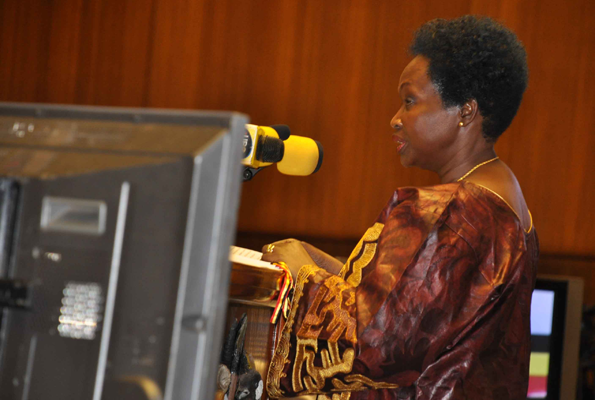Government to hike taxes in Budget amid aid cut


Ms Kiwanuka delivering the 2012/13 Budget. The minister is this afternoon expected to read the 2013/14 Budget is believed to have been derived from tough decisions as the government seeks to plug a huge deficit gap. PHOTO BY GEOFFREY SSERUYANGE.
Finance minister Maria Kiwanuka will today unveil a budget believed to have been derived from tough decisions as President Museveni’s government seeks to convince Ugandans that there are no easy solutions to a deepening cash crisis worsened by an aid freeze resulting from wanton theft of government resources at the Office of the Prime Minister.
Ms Kiwanuka is expected to announce a Shs12 trillion Budget this afternoon that combines spending cuts to various sectors of the economy with tax increments in a package the government hopes will jump-start deficit-reduction and give life to President Museveni’s socio-economic transformation agenda.
After donors withdrew much of direct budget support over theft concerns, Ms Kiwanuka, in her third Budget speech is expected to announce a raft of new tax and revenue measures seeking to plug an unprecedented budget deficit.
On account of theft allegations in the OPM, Ms Kiwanuka is expected to present an unprecedented Budget to Parliament for the 2013/14 financial year, which is almost fully- funded by government after it emerged that the projected external support declined by 93 per cent— from Shs749 billion in 2012/13 to about Shs50 billion in 2013/14.
In the current financial year, donors financed 25 per cent of the Budget, though this includes loans and project financing as well as direct budget support. Out of a Budget of Shs12 trillion planned for next financial year, only Shs8.4 trillion is available for government spending.
To keep the economy afloat, in the next financial year, Ms Kiwanuaka said: “Starting with the next financial year going forward, the national budget will focus on restoring economic stability and rationalising resource allocation to focus investment on infrastructure and development.”
Shs3.6 trillion deficit
In the face of a Shs3.6 trillion deficit in the Budget, Ms Kiwanuka is this afternoon likely to propose that the Income Tax law be amended to introduce new taxes on water, fuel, telecoms, boda-bodas and motor vehicles.
Other proposed taxable items will include mobile money transactions, international calls, cosmetics and hair products. The minister is also expected to announce a levy on fish and dairy exports.
Daily Monitor understands that an additional Shs50 excise duty on fuel, VAT on water, an additional 1 per cent levy on telecom companies among other revenue measures were recommended by the Presidential Budget Committee which drafted the Budget to enable the ruling party plan implementation of its manifesto (2011-2016).
In trying to unveil an ambitious economic plan, one that combines monetary activism with fiscal responsibility reforms specified in Vision 2040, Ms Kiwanuka will this afternoon announce that in the next financial year, the government will strive to expand the taxable base by reaching out to the rich who are already in the monetary economy.
In a slight shift in fiscal strategy, the minister will send a budget plan to Parliament that slightly departs from President Museveni’s recently announced bottlenecks to socio-economic transformation that the leader of opposition in Parliament Nandala Mafabi and other critics ridiculed as “easier said than done”.
“In trying to fix everything we have ended by not doing anything,” Mr Mafabi said. Last week, President Museveni listed 10 strategic bottlenecks to socio-transformation calling upon Ugandans to support him in ensuring that the country becomes a First World country in the next 50 years and a middle income nation in 2017.
The bottlenecks include ending ideological disorientation, building the State pillars to ensure that the State is capable of governing people and protecting them; developing the human resource through education and the improved health for all.
Others include promoting the private sector, developing the infrastructure (especially electricity, railways, the roads, ICT, etc), modernising agriculture, modernising services, integrating the African market, and ensuring democracy. Analysts say next year’s Budget is expected to represent promises that the President made while presenting his State of the Nation Address last week.
Catering for Museveni’s promises
The President promised to introduce a Students’ Loan Scheme as well as repackaging Naads with an ambitious desire of achieving Bonna-Bagaggawale – ‘Prosperity for All’. “A budget that spreads poverty instead of reducing it is not good for our people. We are planning for people whose number we don’t even know and the government is telling us that we are making progress. Let us fight corruption, fix the health sector and inject money in agriculture,” Mr Nandala said recently.
In spite of the cynicism over the 2013/14 Budget, Ms Kiwanuka will today inform the country of government’s new fiscal policy that is benchmarked on monetary policy support to maintain macroeconomic stability, while at the same time increase resources available to address growth constraints.
In line with the National Development Plan the and the NRM Manifesto, Ms Kiwanuka said government priorities for 2013/14 will focus on the expansion of production of goods and services, and growth of per capita income to enhance social wellbeing. However, the task ahead is to ensure export growth in order to reduce the gap between imports and exports which has been widening over the past years.
The minister said in the Budget Framework Paper to Parliament that priority interventions in the 2013/14 budget will focus on promotion of socio-economic development and expansion of service delivery, “so that all Ugandans prosper and live a healthy and productive life”.
Following the reduction of annual inflation- which had peaked at 30.5 per cent in October 2011- to the current 3.6 per cent, in the coming financial year, the minister hopes to ensure that growth in annual inflation remains low, stable and within single digits.
Ms Kiwanuka hopes to sustain economic growth of 7 per cent up from 4.1 per cent of GDP last financial year, maintain an adequate level of foreign exchange reserves of at-least the equivalent of four months of import cover to be able to cushion the economy from external shocks, and maintain a level of exchange rate that is supportive of export growth.
However, people that Daily Monitor spoke to said corruption and leakages in the system are two factors that are likely to negatively affect the achievement of targeted growth of 7 per cent as projected in the Budget Framework Paper.
Even with the latest thumbs up to Uganda’s economic fundamentals, International Monetary Fund (IMF) said the government needs to do more about corruption so as to improve service delivery. Unofficial data puts country’s economic growth in 2013/14 at 5.6 per cent.
2013/14 Budget expectations
Sudhir Ruparelia, Businessman
Business personalities, including Mr Sudhir Ruparelia, say proposed taxes in the 2013/14 Budget could have a chilling effect on economic growth, warning that small businesses might have to struggle through in order to stay afloat in the coming Financial Year.
Thus, they warn the government against tax spikes in the new budget, asking the Finance Minister to inject more money in infrastructure development with special focus on energy and fixing the country’s road network. “Whereas the government needs to expand the taxable base, focus is on a few Ugandans. We want a leveled playing field. A few cannot continue paying taxes when the majority is not being taxed,” Mr Ruparelia says
He adds: “If the government increases taxes on items like fuel, airtime and water, among others, it would confirm its shortsightedness, emphasising how economist have lost track of what the budget is seeking to achieve.” The government, according to Mr Ruparelia needs to invest more in agriculture – the backbone of Uganda’s economy. Agriculture employs about 75 per cent of Ugandans.
Gideon Badagawa, executive director Private Sector Foundation Uganda. Presenting views from the private sector on the 2013/14 Budget proposals, Mr Badagawa, told the Parliamentary Committee on Trade and Tourism that any extra tax levy on fuel would increase the cost of doing business thus hampering Gross Domestic Product growth. He said the private sector has not been consulted in comparison to taxes that are expected to be introduced in today’s Budget.
Although the government is struggling to finance the 2013/14 Budget following the 2012/13 aid cuts, Mr Badagawa said transferring the burden to the taxpayers would be unfortunate. “Increasing taxes without promoting investment is unsuitable. The government should concentrate its efforts on pursuing natural growth,” he said. The government is seeking to widen the current taxable base from 12 to 13 per cent.
Prof Venansius Baryamureeba
Introducing new taxes on essential commodities, including fuel and airtime, might negatively affect revenue collection.
For instance, people might decide to spend less on such items due to the fact that there would be a spike in prices of such commodities. Alternately, the government should inject more money in health, education, agriculture and create other initiatives that help in job creation. There should also be concerted efforts, according to Mr Baryamureba, for the government to improve the country’s infrastructure including roads, energy and other initiatives that look beyond infrastructure.
Wilson Owere, chairman National Organisation of Trade Union. In today’s Budget our main focus is on increment of civil servants’ salaries. The government should also uplift agriculture through providing more funds as well as streamlining tourism funding to create more employment opportunities.
editorial@ug.nationmedia.com








Comments
This post currently has no comments.